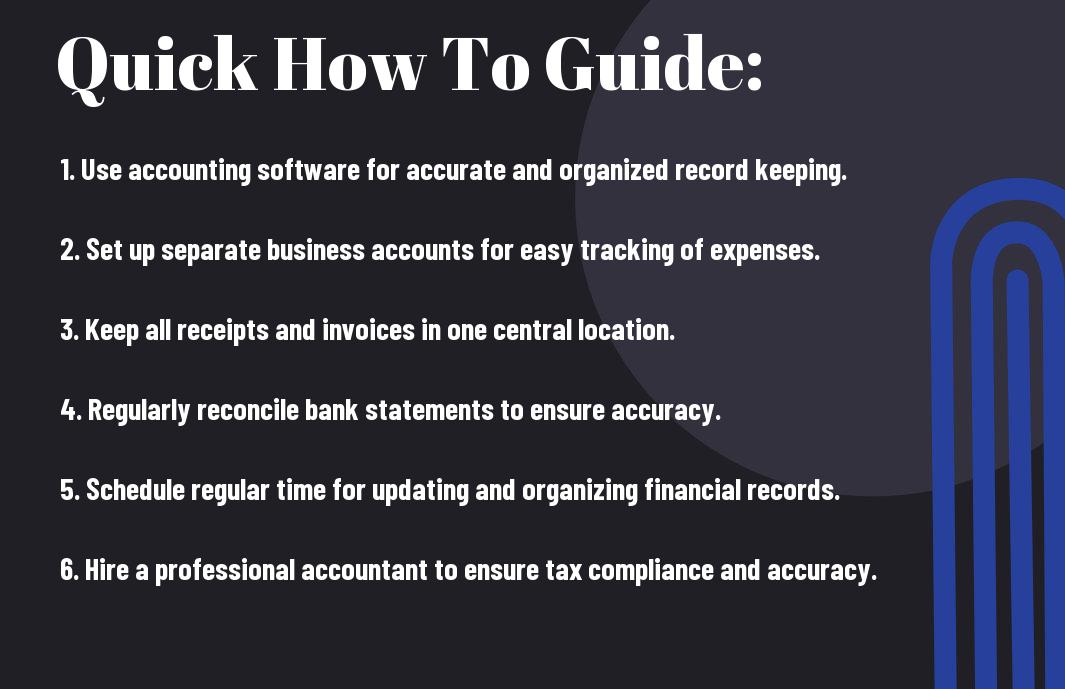How to streamline record keeping for small business finances and tax compliance
Are you tired of the daunting task of keeping track of your small business finances and ensuring tax compliance? It can be overwhelming to stay on top of record keeping, especially when you have limited time and resources. However, establishing a streamlined process for keeping records can make a world of difference in managing your finances and meeting your tax obligations. In this guide, we will provide you with practical tips and strategies to help you optimize your record keeping and make the process as efficient as possible. By implementing these suggestions, you can alleviate the stress and confusion that often comes with maintaining financial records for your small business.
One of the most important aspects of record keeping for small business finances and tax compliance is to establish a clear and organized system. This involves keeping detailed records of all income and expenses, maintaining separate accounts for business and personal finances, and regularly reconciling your accounts. Additionally, it is crucial to keep all necessary documentation, such as receipts and invoices, in a secure and easily accessible manner. By following these practices, you can ensure that you have the necessary information readily available for tax compliance and financial management.
Key Takeaways:
- Implement a digital accounting system: Moving away from paper-based record keeping can streamline the process and save time for small business owners. This not only helps in maintaining accurate records but also ensures easy access during tax season.
- Separate personal and business finances: Keeping personal and business finances separate is essential for accurate record keeping. This can prevent confusion and make tax compliance much easier.
- Regularly reconcile accounts: Reconciling accounts on a regular basis can help in identifying discrepancies and errors early on. This can save time and effort during tax preparation.
- Utilize accounting software: Investing in accounting software can help in automating many financial processes and record keeping tasks. This can significantly reduce the time and effort required for tax compliance.
- Seek professional help when needed: Small business owners should not hesitate to seek professional help when it comes to record keeping and tax compliance. Working with a tax professional can ensure that all financial records are in order and compliant with regulations.

Establishing Your Record-Keeping System
Clearly, the first step in streamlining your record-keeping for small business finances and tax compliance is to establish a robust record-keeping system. This system should be organized, efficient, and in compliance with all relevant regulations. By taking the time to set up a solid system at the outset, you can save yourself countless headaches and potential legal issues down the road.
Essential Tools and Software for Financial Records
When it comes to managing your small business finances, having the right tools and software in place can make all the difference. Investing in a reliable accounting software such as QuickBooks or Wave can help you keep track of your income and expenses, generate financial reports, and even prepare your taxes. Additionally, cloud-based storage solutions like Dropbox or Google Drive can provide secure backup for your financial records, ensuring that you never lose important data.
Tips for Setting Up Your Accounting System
Setting up an effective accounting system for your small business involves several key steps. First, you’ll want to establish a chart of accounts that accurately reflects the financial activities of your business. Next, you’ll need to decide on a method for tracking your income and expenses, whether it’s through cash accounting or accrual accounting. It’s also important to keep all of your financial records organized and up to date, as this will make tax time much less stressful. Finally, you should consider seeking the guidance of a professional accountant to ensure that your system is set up correctly and in compliance with all relevant laws and regulations.
- Establish a chart of accounts that accurately reflects your financial activities.
- Decide on a method for tracking income and expenses, such as cash accounting or accrual accounting.
- Keep all financial records organized and up to date to make tax time less stressful.
- The guidance of a professional accountant can ensure your system is set up correctly and in compliance with all relevant laws and regulations.
Categorizing Business Transactions
The first step in streamlining your record keeping for small business finances and tax compliance is to categorize your business transactions. This involves organizing your revenue and expenses into specific categories, such as income, cost of goods sold, operating expenses, and taxes. By doing so, you can easily track and monitor your financial activities, ensuring that you have a clear understanding of where your money is coming from and where it is going.
How-to Identify Business Expenses
Identifying and categorizing your business expenses is crucial to managing your finances effectively. To do this, you need to keep a detailed record of all your business-related spending, including receipts, invoices, and other relevant documents. This will help you determine which expenses are tax-deductible and which are not, allowing you to maximize your tax savings and minimize your tax liability.
The Role of Receipts and Invoices in Record Keeping
Receipts and invoices play a critical role in record keeping for small business finances and tax compliance. These documents provide a clear and accurate record of your business transactions, allowing you to track your income and expenses with precision. By keeping all your receipts and invoices organized and easily accessible, you can ensure that you have the necessary documentation to support your tax deductions and credits, helping you avoid any potential issues with the IRS.
Streamlining the Data Entry Process
To streamline record-keeping for small business finances and tax compliance, it’s essential to efficiently manage your data entry process. This is where small business accounting software comes into play. You can unlock efficiency with small business accounting software that simplifies your data entry tasks and automates many of the processes, reducing the need for manual entry and the risk of errors.
Best Practices for Regularly Recording Financial Transactions
Regularly recording financial transactions is crucial for maintaining accurate financial records and ensuring tax compliance. To streamline this process, establish a regular schedule for entering transactions into your accounting software. This may include daily, weekly, or monthly updates, depending on the volume of your transactions. By staying consistent with your data entry, you can avoid the stress of backlogging and ensure that your financial records are up to date.
Automating Financial Management with Software Solutions
Automating your financial management processes with software solutions can greatly streamline your record-keeping and tax compliance efforts. Look for accounting software that offers features such as bank feeds integration, automatic categorization of transactions, and reconciliation capabilities. These features can significantly reduce the time and effort needed to manage your finances, allowing you to focus on growing your business and maximizing your profitability.
Maintaining Accurate Financial Records
Now that you have set up your small business financial record keeping system, it’s important to ensure that it remains accurate and up-to-date. Maintaining accurate financial records is crucial for both your business’s day-to-day operations and for meeting tax compliance requirements. This chapter will focus on the factors affecting the integrity of financial data and how to perform regular financial audits to ensure accuracy.
Factors Affecting the Integrity of Financial Data
When it comes to maintaining accurate financial records, there are several factors that can impact the integrity of your data. Key factors include human error, outdated software or technology, lack of internal controls, and potential fraud or theft. It’s important to be aware of these factors and take proactive steps to minimize the risks associated with them.
- Human Error: This can occur at any stage of the record-keeping process, from data entry to reconciliation. Training and supervision of staff, as well as implementing automated systems, can help minimize the impact of human error.
- Outdated Software or Technology: Using outdated software or technology can lead to inaccuracies and inefficiencies in financial record keeping. Regularly updating your systems and software is essential to maintaining accuracy.
- Lack of Internal Controls: Without proper internal controls, such as segregation of duties and authorization processes, there is a higher risk of error or fraud affecting the integrity of your financial data.
- Potential Fraud or Theft: It’s essential to have checks and balances in place to safeguard against fraud and theft. This can include implementing security measures and conducting regular audits.
Assume that these factors can pose a threat to the accuracy of your financial records, and take proactive measures to mitigate these risks.
How-to Perform Regular Financial Audits
Performing regular financial audits is a critical component of maintaining accurate financial records. An audit involves reviewing and verifying your financial transactions, statements, and documentation to ensure their accuracy and compliance with regulations. To conduct a financial audit for your small business, you need to follow these steps:
- Establish Audit Objectives: Identify the specific financial areas and processes that will be audited, such as sales, expenses, and payroll.
- Conduct a Detailed Review: Thoroughly examine your financial records, including invoices, receipts, bank statements, and accounting ledgers, to identify any discrepancies or irregularities.
- Implement Corrective Actions: If any errors or issues are discovered during the audit, take prompt corrective actions to rectify them and prevent recurrence in the future.
Regular financial audits help to ensure the accuracy and reliability of your financial records while providing insights into your business’s financial health.
Preparing for Tax Compliance
After streamlining your record keeping, the next step in ensuring tax compliance for your small business is to prepare for tax filing. This involves organizing your records in a way that makes tax filing easy and understanding the deductions and credits available to your business.
How-to Organize Records for Easy Tax Filing
Organizing your records is essential for easy tax filing. Make sure you keep all your financial records, receipts, and invoices in one centralized location. This could be physical files or digital folders on your computer. You should also categorize your expenses, such as office supplies, utilities, and travel, to simplify the process of claiming deductions. Keeping detailed, up-to-date records throughout the year will save you time and stress when it comes to tax season. Consider using accounting software or hiring a professional to help you keep track of your finances and ensure accuracy.
Understanding Deductions and Credits for Small Businesses
Knowing the deductions and credits available to your small business can help you minimize your tax liability and maximize your savings. Deductions such as business expenses, home office deductions, and vehicle expenses can significantly reduce your taxable income. You should also be aware of any tax credits that you may be eligible for, such as the Small Business Health Care Tax Credit or the Research and Development Tax Credit. Understanding these deductions and credits can have a positive impact on your bottom line and should not be overlooked.
Keep in mind that some deductions and credits may come with specific requirements and limitations, so it’s important to stay informed and seek professional advice if needed. Identifying and taking advantage of these tax-saving opportunities can have a significant impact on your business finances and tax compliance.
Legal Requirements and Record Retention
Unlike individuals, businesses are subject to specific legal requirements for record keeping and retention. As a small business owner, it is crucial for you to understand and comply with these regulations to avoid potential penalties and fines. Keeping accurate and up-to-date financial records is not only important for your own business operations, but it is also necessary for tax compliance and legal purposes.
Tips for Complying with Federal and State Regulations
When it comes to compliance with federal and state regulations for record keeping, there are a few key tips to keep in mind. Firstly, ensure that you are aware of the specific requirements that apply to your business based on its size, industry, and location. Familiarize yourself with the guidelines provided by the Internal Revenue Service (IRS) and your state’s department of revenue.
- Keep up with changes: Regulations can change, so it’s important to stay updated on any new requirements that may affect your business.
- Utilize accounting software: Investing in reliable accounting software can help you stay organized and comply with regulatory requirements.
Recognizing the nuances of these regulations and staying proactive in your compliance efforts can help you avoid potential legal issues in the future.
Recommended Timeframes for Keeping Business Documents
When it comes to record retention, it’s essential to understand the recommended timeframes for keeping various types of business documents. For example, financial statements, tax returns, and supporting documents should generally be kept for a minimum of seven years to ensure compliance with IRS regulations.

Conclusion
Conclusively, streamlining record keeping for your small business finances and tax compliance is essential for ensuring financial stability and legal compliance. By implementing digital tools and cloud-based accounting systems, you can simplify and automate the record keeping process, reducing the risk of errors and saving valuable time. Additionally, staying organized and maintaining accurate records will not only make tax season less stressful, but also provide a clear overview of your business’s financial health, enabling you to make informed decisions and plan for the future.
FAQ
Q: Why is it important for small businesses to streamline record keeping for finances and tax compliance?
A: It is crucial for small businesses to streamline record keeping for finances and tax compliance in order to maintain accurate financial records, fulfill tax obligations, and facilitate business growth. Efficient record keeping also helps in avoiding penalties from tax authorities and ensures the smooth running of the business.
Q: What are some effective ways to streamline record keeping for small business finances?
A: To streamline record keeping for small business finances, it is important to utilize accounting software to automate and organize financial data, maintain separate business and personal accounts, regularly reconcile bank statements, and digitize receipts and invoices. Additionally, keeping detailed records of all transactions and expenses is essential for accurate financial reporting and tax compliance.
Q: How can small businesses ensure tax compliance through streamlined record keeping?
A: Small businesses can ensure tax compliance through streamlined record keeping by maintaining organized and up-to-date financial records, tracking deductible expenses, and keeping accurate records of income and expenditures. Additionally, partnering with a qualified accountant or tax professional can provide valuable guidance on tax laws and regulations, ensuring that the business is meeting all tax obligations.



